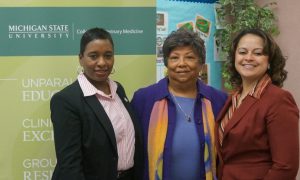On January 18, students, faculty, and staff attended the annual Martin Luther King, Jr. Day event.
MSU alumnae Stephanie Miles-Richardson and Rachel Cezar returned to the MSU College of Veterinary Medicine last Monday to speak about the paths their careers have taken and to inspire a new generation of veterinarians. The two spoke at the College’s annual Martin Luther King Jr. Day event.

Miles-Richardson earned her DVM from Tuskegee University in 1992 and her PhD in pathology/environmental toxicology from Michigan State University in 1997. She is currently the assistant dean for Graduate Education in Public Health and associate professor in the Department of Community Health and Preventive Medicine at the Morehouse School of Medicine, where she also serves as the director of the Master of Public Health Program.
Miles-Richardson’s path to public health began while she was working on her PhD at MSU. She went on to work for more than a decade at the Centers for Disease Control and Prevention and the Agency for Toxic Substances and Disease Registry. Her current research involves health disparities in underserved communities, as well as initiatives to address diversity and inclusion in public health. Miles-Richardson said that she was honored to be invited back to speak on such an important day.
"Diversity in the public health professions is critical,” said Miles-Richardson. “It is important that people in the community see diversity among the individuals serving them.”
Miles-Richardson wants to encourage all veterinary students to consider the breadth and depth that the profession has to offer.
“I hope that I influence students to take the time and effort to discover who they are and what it is that they want to do," said Miles-Richardson. "I want them to go out and make the world a better place."
Cezar also uses her veterinary degree in a non-clinical capacity. After earning her DVM from Michigan State University in 2002, Cezar went on to intern for the Dubai Equine Hospital in the United Arab Emirates. In 2004, she began her work with the United States Department of Agriculture as a veterinary medical officer. In 2006, she joined the Air National Guard as a public health officer. She currently serves as the National Horse Protection coordinator and the supervisory veterinary program manager for the United State Department of Agriculture.
As the USDA/APHIS National Horse Protection coordinator, she is responsible for enforcing the Horse Protection Act in the United States. In this role, she likes that she doesn’t treat just one animal at a time—she is helping all the horses in the country.
Cezar also has a national impact advocating for diversity in the profession. She speaks to students often, and wants to help them live their dreams and professional aspirations. In the horse world, she is often the only person of color at meetings. She would like to see that change.
Cezar said that she hopes to inspire all students to get involved with organizations while in school.
“The veterinary medical profession has so much to offer. There are so many opportunities for students to get involved at Michigan State, and I hope that the students here today will go out and take advantage of those opportunities.”
Miles-Richardson and Cezar talked about the importance of a strong support network for minority students, and both cited Ms. Patricia Lowrie and Dr. Jon Patterson as mentors. Miles-Richardson said Patterson’s warmth and guidance was important to her success. So, too, were the many fellow Tuskegee students at the College at that time. Cezar echoes Miles-Richardson’s sentiment on her mentors.
“Without the guidance of Dr. Patterson and Pat Lowrie, I wouldn’t be where I am today,” said Cezar.
The College’s Office of Diversity organizes the annual event.
“We are very fortunate to have such accomplished alumnae speak to the College at this important event,” said College of Veterinary Medicine Dean John Baker. “Dr. Miles-Richardson and Dr. Cezar each bring unique perspectives on non-clinical careers in veterinary medicine, and each has an important perspective on the challenges of students from underrepresented groups. Increasing diversity in our profession is of critical importance.”
